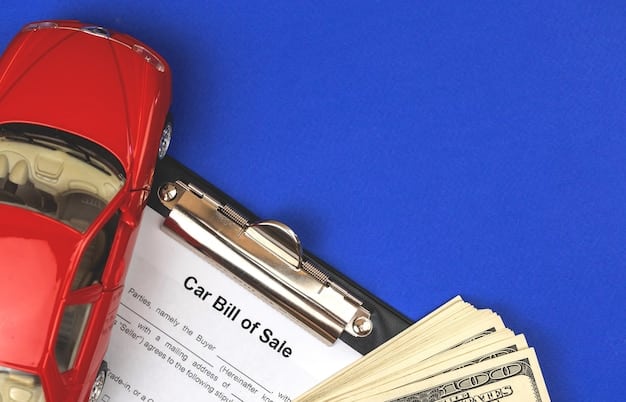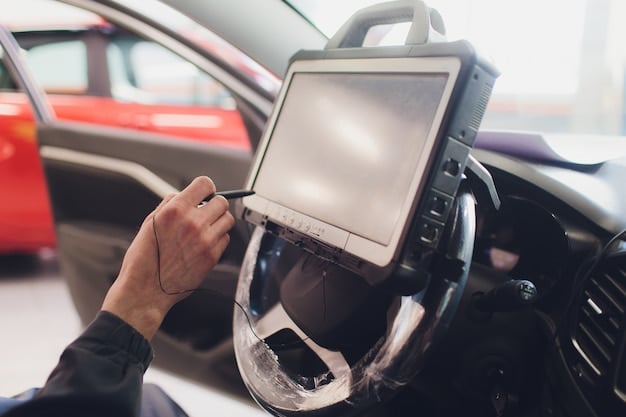Buying a Car Out of State in 2025: Tax & Registration Guide

Buying a car out of state in 2025 involves navigating varying state laws on sales tax, vehicle registration, and emissions testing, which can significantly impact the final cost and paperwork required.
Planning on buying a car out of state in 2025: understanding registration and tax implications? This comprehensive guide breaks down everything you need to know to navigate the process smoothly and avoid unexpected costs.
Buying a Car Out of State: Initial Considerations
Purchasing a vehicle from a dealership or private seller in another state can seem appealing, especially if you’re seeking a specific model or a better price. However, before you embark on this venture, it’s crucial to understand the complexities involved.
This section outlines the preliminary aspects to consider before committing to an out-of-state car purchase.
Researching State Laws
Each state has its own set of rules and regulations regarding vehicle sales, taxes, and registration. Thorough research is essential to avoid potential pitfalls.
Checking Vehicle History
Always obtain a vehicle history report, regardless of where you buy the car. This report can reveal important information about the car’s past, such as accidents, damage, or title issues.
- Verify the seller’s credentials and reputation.
- Understand your financing options and how they might be affected by an out-of-state purchase.
- Consider transportation costs and logistics for getting the car to your home state.
By addressing these initial considerations, you can lay a solid foundation for a successful out-of-state car buying experience.
Navigating Sales Tax Across State Lines
Sales tax is one of the most significant financial factors to consider when buying a car out of state in 2025: understanding registration and tax implications. Understanding how sales tax applies to your situation can potentially save you a lot of money and avoid surprises at the DMV.
This section explains the intricacies of sales tax when buying a car across state lines.
Where Do You Pay Sales Tax?
Generally, you pay sales tax in the state where you register the vehicle, not where you purchase it. This means that even if you buy a car in a state with a lower sales tax rate, you’ll still be responsible for paying the sales tax rate in your home state.
Understanding Tax Reciprocity
Some states have reciprocity agreements regarding sales tax. These agreements can affect how sales tax is calculated and collected when you buy a car out of state.

- Check your home state’s Department of Revenue website for specific guidance on out-of-state car purchases.
- Keep detailed records of all transactions and paperwork related to the purchase.
- Be prepared to provide proof of residency when registering the vehicle in your home state.
Navigating sales tax can be complex, but with proper research and preparation, you can ensure compliance and avoid unexpected tax liabilities. It is crucial when buying a car out of state in 2025: understanding registration and tax implications.
Registering Your Vehicle in Your Home State
Registering your vehicle in your home state is a crucial step after buying a car out of state in 2025: understanding registration and tax implications. This process ensures that your vehicle is legally recognized in your home state and allows you to operate it without facing legal complications.
This section provides a comprehensive overview of the registration process.
Gathering Required Documents
Before heading to your local Department of Motor Vehicles (DMV), gather all necessary documents. These typically include:
- The original title or Certificate of Origin.
- Bill of Sale.
- Proof of insurance.
- Odometer Disclosure Statement.
- Valid driver’s license or identification.
Completing the Application
Fill out the vehicle registration application accurately and completely. Ensure all information matches the details on the title and other supporting documents.
Vehicle Inspection and Emissions Testing
Many states require a vehicle inspection before registration. This is particularly important when buying a car out of state in 2025: understanding registration and tax implications.
The registration process is a crucial step in legally owning and operating your out-of-state vehicle. Proper preparation and attention to detail can streamline the process and ensure compliance with your state’s regulations.
Emissions and Inspection Requirements
Emissions and inspection requirements are important considerations when buying a car out of state in 2025: understanding registration and tax implications. These requirements ensure that your vehicle meets the environmental and safety standards of your home state.
This section delves into the details of emissions and inspection requirements.
Understanding State-Specific Standards
Each state has its own emissions standards and inspection protocols. Some states, like California, have stricter regulations than others.
Obtaining Necessary Certifications
If your newly purchased vehicle doesn’t meet your home state’s emissions standards, you may need to obtain specific certifications or make modifications to the vehicle.

- Research your home state’s emissions and inspection requirements before buying a car out of state.
- Confirm whether the vehicle you’re considering meets those standards.
- Prepare to undergo an inspection and address any necessary repairs or modifications promptly.
Addressing emissions and inspection requirements proactively can help you avoid registration delays and ensure your vehicle is compliant with state regulations.
Financing an Out-of-State Car Purchase
Financing is a critical aspect of buying a car out of state in 2025: understanding registration and tax implications. Securing the right financing option can significantly impact your budget and overall purchasing experience.
This section outlines the essential considerations for financing an out-of-state car purchase.
Securing Pre-Approval
Before you begin shopping, get pre-approved for an auto loan. This gives you a clear understanding of your budget and strengthens your negotiating position.
Considering Loan Restrictions
Some lenders may have restrictions on financing out-of-state vehicle purchases. Be sure to inquire about any such limitations before committing to a loan.
Working with Local Lenders
Consider working with local banks or credit unions in your home state. They may be more familiar with your state’s regulations and better equipped to handle the transaction.
Approaching financing strategically can empower you to make informed decisions and secure the best possible terms for your situation.
Title Transfers and Paperwork
Handling title transfers and paperwork accurately is essential when buying a car out of state in 2025: understanding registration and tax implications. Mistakes or omissions can lead to delays and complications in the registration process.
This section highlights the critical steps involved in title transfers and paperwork.
Verifying the Title
Carefully inspect the vehicle’s title to ensure it is authentic and free of any liens or encumbrances. A clean title is essential for a smooth transfer.
Completing the Transfer Forms
Work with the seller to complete all necessary transfer forms accurately and thoroughly. Double-check all information for errors.
Submitting Documents to the DMV
Submit the completed transfer forms, along with any other required documents, to your local DMV. Be prepared to pay any applicable fees.
Attention to detail and adherence to proper procedures are crucial for a successful title transfer and a hassle-free registration experience.
| Key Aspect | Brief Description |
|---|---|
| 🚗 Sales Tax | Pay in your home state, not where you buy the car. |
| 📝 Registration | Requires title, bill of sale, and proof of insurance. |
| 🛡️ Inspection | Ensures car meets your state’s safety & emissions standards. |
| 💰 Financing | Get pre-approved and check lender restrictions. |
Frequently Asked Questions (FAQ)
▼
Generally, no. You typically pay sales tax only in the state where you register the vehicle, which is usually your home state.
▼
You’ll typically need the original title, bill of sale, proof of insurance, and a valid driver’s license or ID.
▼
It depends on your home state’s requirements. Many states require a vehicle inspection before registration.
▼
Yes, but some lenders may have restrictions on financing out-of-state purchases. It’s best to get pre-approved.
▼
You may need to obtain specific certifications or make modifications to the vehicle to meet your state’s standards.
Conclusion
Buying a car out of state in 2025: understanding registration and tax implications involves several key steps, including sales tax considerations, vehicle registration, emissions and inspection compliance, financing, and title transfers. By carefully researching and preparing for each of these aspects, you can navigate the process successfully and make a well-informed decision.





